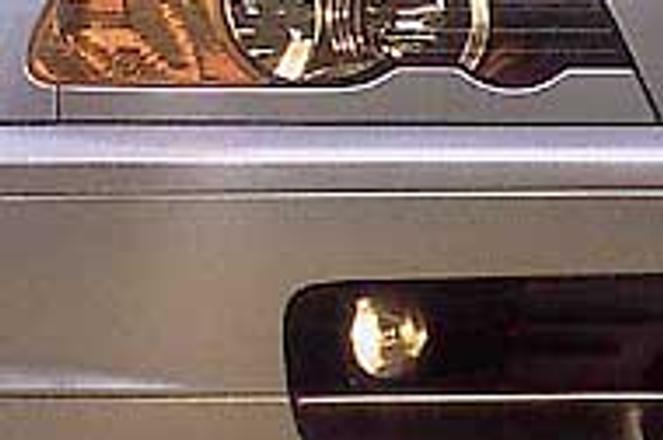LEASING is making expensive models more affordable.photo: File photo
IN SPITE of a two-year decline in car sales, Slovak leasing companies have been steadily expanding as more Slovaks opt for financial plans in purchasing their cars rather than paying in cash.
Slovakia's leasing market as a whole grew by nearly 15 per cent last year, driven in part by the leasing of new and used cars, which remains the sector's largest segment. Around half of the 68,000 new cars sold last year in Slovakia were leased, while the share of used cars sold on lease grew to as much as 15 to 20 per cent, say Slovak leasing firms.
"The total number of cars sold, particularly new cars, will probably fall on average this year compared to previous years," said Peter Palkovič, sales manager for GE Capital Leasing's Slovak subsidiary.
"Between 2001 and 2002, the number of cars sold fell by around 7 per cent. The expectation is that between 2002 and 2003, sales will decline on average by around 5 per cent, so a lesser decline.
"But while the number of cars sold will fall, the share of cars that are leased will rise, and leasing companies in general are expanding. Because of that the prediction is that the leasing market will continue to grow," he said.
Until a few years ago, cash was the preferred payment method for Slovaks buying cars. However, as models available and overall prices have increased, so has the variety of financing plans, both through traditional bank loans and through leasing companies.
While an individual financing a car purchase from a bank loan has a higher degree of ownership, leasing companies say they are able to tie the car purchase with insurance packages that buyers would otherwise not be able to get, thus making leasing a more attractive option.
"The basic difference [between leasing and a bank loan] is that the owner of a leased car is the leasing company, while a car bought on a bank loan belongs to the buyer," said Palkovič.
"But a leasing company can also arrange advantageous accident and theft insurance, which a person borrowing from a bank would not be able - or required - to have.
"In 95 per cent of cases, an accident insurance policy, including theft, is part of the leasing contract, and there is also the option to insure monthly payments against the possibility that a client is unable to pay [the monthly lease premium]," he said.
Leasing firms in Slovakia offer both financial and operative leasing packages. While both entail the same basic owner-user relationship between leasing company and car buyer, a car bought on a financial lease becomes the property of the user when the lease is paid; in an operative lease, ownership remains with the leasing company.
Required down payments also vary between the plans, and depend on the type and value of vehicle purchased.
"For new cars on financial leasing, the standard down payment is 10 per cent. For operational leasing, it can be zero. But for used cars, the standard down payment is higher - maybe 20 to 40 per cent, depending on the type of car," said Palkovič.
Nevertheless, he cautions that automobile purchases always entail certain hazards, and that buyers should seek a financial partner they can trust.
"The risks of buying a new car are smaller, because there is already a guarantee that the car is good. The decision then is on the leasing company, and it is necessary to select a financially strong and well-known company. It might not be the cheapest leasing, but it guarantees that the client will not lose the car during the term of the lease.
"Often a leasing company will use its property - its leased cars - as collateral to secure financing for further cars. There is a danger, particularly with smaller companies, that if for whatever reason the leasing firm can't meet the terms of its loans and crashes, it still has the right to take back the car," said Palkovič.
Buying a used car involves a higher level of risk, as some vehicles on the market may have incomplete maintenance records, hidden damage, or may be circulating without proper documentation, said Palkovič.
"With used cars, it is also necessary to work with a strong partner who has enough resources and is well known, because leasing is a long-term proposition. Unfortunately, on the Slovak market there are cars put together or repaired with spare parts and then put back on the market," said Palkovič.
He added that most reputable companies have checking mechanisms in place, to make sure their used cars are not put together from parts of cars that have been stolen or involved in serious accidents, for example, and to confirm the veracity of documentation.
While auto-industry analysts are not expecting a jump in car sales in the near future, the Slovak Association of Leasing Companies (ALS) is predicting the leasing market will grow by around 10 per cent in 2003.
Leasers predict that people will increasingly look to lease cars, as competition among banks and leasing companies drives prices down and people become more accustomed to paying monthly for large purchases.
"Our clients are getting used to the experience that it is more advantageous to buy [a car] on monthly instalments rather than paying in cash," said Palkovič.
"In Slovakia, I think there is still a hunger for cars; that the number of cars is still relatively small," he added.

